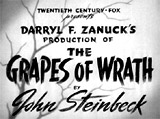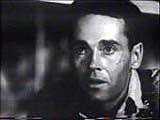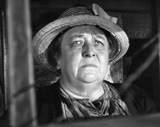
|
The Grapes
of Wrath (1940)
In John Ford's seminal film, an adaptation of John
Steinbeck's 1939 novel, with documentary-like photography of cinematographer
Gregg Toland, about migrant tenant farmer Okies in the Depression-Era:
- the opening scene of a flat, paved highway road
in rural Oklahoma lined by telephone poles, focusing on a small
figure walking towards a crossroads; the man, later identified
as Tom Joad (Henry Fonda), asked a nervous truck-driver for a lift
- he had been released from prison (on early parole after serving
a short prison term of four years for homicide) and was hitchhiking
on his way home to his family's 40-acre sharecropping farm
- during his long trek home, Tom's dramatic meeting
with slightly mad, apostate, itinerant ex-preacher Casy (John Carradine),
who described his spiritual loss ("I lost the spirit. I got
nothin' to preach about no more, that's all. I ain't so sure of things")
- after arriving at the dark, wind-blown Joad cabin,
Tom was stunned to find it abandoned and deserted - from the shadows
emerged a crazy, "touched," dispossessed tenant farmer
- former neighbor Muley Graves (John Qualen) who became deranged
after surrendering his land; Tom learned that his own family, two
weeks earlier, was forcibly evicted to the farm of Uncle John, but
they would be there only short-term; Muley described what was happening: "Everybody's
got to get off. Everybody's leavin', goin' out to California. Your
folks, my folks, everybody's folks"
- he blamed everyone's problems on the weather's dust storms: "The
dusters. They start it anyways. Blowin' like this year after year.
Blowin' the land away. Blowin' the crops away. And blowin' us away
now"
- the two flashbacks and speeches of Muley about losing
the land; in the first flashback, he remembered how he, one of the
dispossessed, was driven off the land by the Shawnee Land and Cattle
Company, and he told about what his lost land meant to him: ("There
ain't nobody gonna push me off my land! My grandpaw took up this
land seventy years ago. My paw was born here. We was all born on
it. An' some of us was killed on it. (Muley squatted down and fingered
the dust of the farm he had just lost.) An' some of us died on it.
That's what makes it arn. Bein' born on it and workin' on it and
dyin', dyin' on it. An' not no piece of paper with writin' on it")
- in his second flashback, Muley - with his shotgun
- powerlessly confronted a house-demolishing caterpillar, and explained
why he still remained afterwards: "There wasn't nothin' to eat,
but I couldn't leave. Somethin' just wouldn't let me. So now I just
wander around and sleep wherever I am. I used to tell myself that
I was lookin' out for things, so that when the folks come back everything'd
be all right. But I know'd it wasn't true. There ain't nothin' to
look out fer. There ain't nobody ever comin' back. They're gone!
And me, I'm just an old graveyard ghost. That's all in the world
I am"
- at the Joad household (now residing temporarily at
Uncle John's farm), the sequence of Tom's nostalgic reunion with
his mother Ma Joad (Oscar-winning Jane Darwell) in the yard - she
was concerned about his well-being after being hardened by prison
life: "Did they hurt ya, son? Did they hurt ya and make ya mean
mad?...Sometimes they do somethin' to ya. They hurt ya and ya get
mad and then ya get mean. Then they hurt ya again and ya get meaner
and meaner til you ain't no boy nor man anymore, just a walkin' chunk
of mean mad. Did they hurt ya that way son?...Why, I don't want no
mean son"

|

|

|
|
Tom's Reunion with Mother
|
Handbill for Employment in California
|
Ma Joad Burning Letters and Keepsakes (Holding
Earrings to Her Ears)
|
- the scene of widowed Uncle John (Frank Darien) who
enthusiastically showed off a handbill advertising high wages for
workers in California to harvest fruits and vegetables, their only
alternative to facing eviction the following day
- the pre-dawn, candle-lit scene of Ma Joad, accompanied
by the plaintive strains of "Red River Valley" on an accordion,
pausing to moon over and then burn her letters and souvenir-keepsakes
(a newspaper clipping, a postcard, a china souvenir, and earrings)
in the stove (including the image of her holding earrings to her
ears and viewing herself in a mirror)
- the departure at daybreak in the Joad's dilapidated
truck before a long drive from the Dust Bowl of Oklahoma to California
during the Depression, with the promise of employment; Ma delivered
a resolute speech about their leaving: "We're goin' to California,
ain't we? All right then, let's go to California...I never had my
house pushed over before. Never had my family stuck out on the road.
Never had to lose everything I had in life"
- the scene of the lunchroom waitress at a New Mexico
filling station and truck stop diner who sold candy at reduced price
("two for a penny" instead of "a nickel a piece candy")
to the migrant Joad children
- the sequences of their arrival at three contrasting
camps in California - the Hooverville Transient-Migrant Camp (14
minutes duration), the Keene Fruit Ranch (22 minutes duration), and
the Farmworkers' Wheat Patch Government Camp (25 minutes duration)
- mostly overcrowded and with exploitative work practices, exemplified
in the scene of a land contractor hiring migrant laborers after driving
into the Hooverville camp in a shiny convertible and offering cheap-wages
employment picking fruit
- the fateful scene of Casy's death (due to his organizing
strikers) by club-wielding thugs at the Keene Ranch, and Tom's defensive
reaction to the vicious attack by attacking and killing an authoritarian "tin-shield"
guard in retaliation - another violation of his parole in addition
to his migration - causing him to prepare to flee from his family
- the sequence of fugitive Tom's eloquent farewell to
his heartbroken Ma with the words: ("Well, maybe it's like Casy
says. A fella ain't got a soul of his own - just a little piece of
a big soul. The one big soul that belongs to everybody... Then it
don't matter. I'll be all around in the dark. I'll be everywhere
- wherever you can look. Wherever there's a fight so hungry people
can eat, I'll be there. Wherever there's a cop beatin' up a guy,
I'll be there. I'll be in the way guys yell when they're mad. I'll
be in the way kids laugh when they're hungry and they know supper's
ready. And when the people are eatin' the stuff they raise, and livin'
in the houses they build, I'll be there, too")
- Tom Joad's march up a distant hillside - seen as
a tiny image silhouetted against the morning sky; an outcast, he
disappeared into the morning light - forever
- in the final scene, the indomitable matriarch Ma's
inspiring and meditative words in the front seat of a pickup truck,
that she would hold the family together, and she vowed that no force
could destroy the 'people's' will in their resilient, ever-moving
search of work: ("We're the people that live. They can't wipe
us out. They can't lick us. And we'll go on forever, Pa... 'cause...
we're the people")

|

|

|
|
Tom's "I'll Be There" Speech
|
Silhouetted March Up Hillside
|
Ma Joad: "We're the people"
|
|


Hitchhiking Figure Walking Toward Crossroads and Getting
Lift From Truck Driver

Tom Joad with Preacher Casy

The Deserted Joad Homestead

Muley's Protest: "There ain't nobody gonna
push me off my land!"

Ma's Resolute Speech

The Long Journey to California

Candy Sold at Reduced Price

Exploitation of Workers at a Migrant Camp by an
Employer


The Joads' Arrival at the Keene Ranch, An Oppressive
Labor Camp
|












